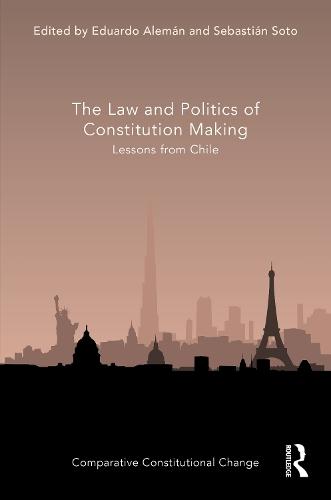Overview
This collection examines Chile’s two recent efforts to replace its constitution, both of which ultimately failed despite broad initial support. Drawing global media and scholarly attention, these high-profile processes offer critical lessons for understanding the challenges of democratic constitution making. The book features contributions from constitutional lawyers, political scientists, and other experts, including seven constitution writers, providing both academic analysis and firsthand accounts. It explores the institutional design of the constitution-making bodies, the influence of Chile’s political context, the substantive proposals advanced in key policy areas, and the behavior of political actors and voters. It also offers insider evaluations of institutional and procedural choices that either supported or undermined the process. This volume is a key resource for scholars and policymakers interested in constitutional design, institutional reform, and Latin American politics. Readers in political science, constitutional law, and Latin American studies will find its analysis of Chile’s process both informative and timely. Its interdisciplinary approach—blending comparative, legal, and empirical perspectives with practitioner insight—ensures broad relevance and appeal.
Full Product Details
Author: Eduardo Alemán ,
Sebastián Soto Velasco
Publisher: Taylor & Francis Ltd
Imprint: Routledge
Weight: 0.800kg
ISBN: 9781041006244
ISBN 10: 1041006241
Pages: 332
Publication Date: 25 November 2025
Audience:
College/higher education
,
Tertiary & Higher Education
Format: Hardback
Publisher's Status: Active
Availability: Not yet available

This item is yet to be released. You can pre-order this item and we will dispatch it to you upon its release.
Reviews
'Chile’s two recent attempts to draft a new constitution were among the world’s most closely watched and consequential constitutional developments of the past decade. Both drafting processes were thoughtfully designed and highly participatory, yet ultimately unsuccessful. The Law and Politics of Constitution Making: Lessons from Chile brings together reflections from leading constitutional scholars, social scientists, and direct participants in those efforts. The volume offers the most comprehensive examination to date of what transpired, why it failed, and what the world can learn from Chile’s experience. Adam Chilton, Dean and Howard G. Krane Professor of Law, University of Chicago Law School 'This interdisciplinary volume provides extraordinary insight into Chile’s two recent failed constitution-making episodes, including perspectives by leading academic experts and insiders to both processes. This is an indispensable resource for anyone interested in understanding the Chilean processes, and the complexities of constitutional change more broadly.' David Landau, Tobias Simon Eminent Scholar Chair, Florida State University College of Law 'This book is a major contribution to global understanding of the challenges of making a new Constitution in the 21st century. Written by Chile specialists from diverse perspectives, it demonstrates how social, political, and legal context shape processes and determine outcomes. A fascinating study; not to be missed.' Cheryl Saunders, Laureate Professor Emeritus, University of Melbourne, Australia 'The Law and Politics of Constitution Making is a remarkable book: It focuses on the most spectacular, highlighted, iterated, and aborted process of constitutional revision and replacement of the twenty-first century. It involves the positions and analyses of academics, experts, and practitioners. It covers the different stages of the project. It explains how the agenda setters (constitution-making bodies) selected extreme political proposals which led to two rejections of constitutional drafts and the final survival of the Pinochet constitution after its solid rejection by referendum by the Chilean people. A book highlighting the fascinating details of a very controversial and complicated political process.' George Tsebelis, Anatol Rapoport Collegiate Professor of Political Science, University of Michigan, USA
'Chile’s two recent attempts to draft a new constitution were among the world’s most closely watched and consequential constitutional developments of the past decade. Both drafting processes were thoughtfully designed and highly participatory, yet ultimately unsuccessful. The Law and Politics of Constitution Making: Lessons from Chile brings together reflections from leading constitutional scholars, social scientists, and direct participants in those efforts. The volume offers the most comprehensive examination to date of what transpired, why it failed, and what the world can learn from Chile’s experience. Adam Chilton, Dean and Howard G. Krane Professor of Law, University of Chicago Law School 'This interdisciplinary volume provides extraordinary insight into Chile’s two recent failed constitution-making episodes, including perspectives by leading academic experts and insiders to both processes. This is an indispensable resource for anyone interested in understanding the Chilean processes, and the complexities of constitutional change more broadly.' David Landau, Tobias Simon Eminent Scholar Chair, Florida State University College of Law 'This book is a major contribution to global understanding of the challenges of making a new Constitution in the 21st century. Written by Chile specialists from diverse perspectives, it demonstrates how social, political, and legal context shape processes and determine outcomes. A fascinating study; not to be missed.' Cheryl Saunders, Laureate Professor Emeritus, University of Melbourne, Australia
Author Information
Eduardo Alemán (PhD, Political Science, UCLA) is Professor of Political Science at the University of Houston, USA. His research focuses on the comparative analysis of political institutions and Latin American politics. Sebastián Soto Velasco (LLM, Columbia University, and PhD Law, Universidad de Chile) is Associate Professor at the Law School of Pontificia Universidad Católica de Chile, and researcher in the Centro de Estudios Públicos (CEP). In the second constitutional process, he served as Vice-President of the Expert Committee (2023).



